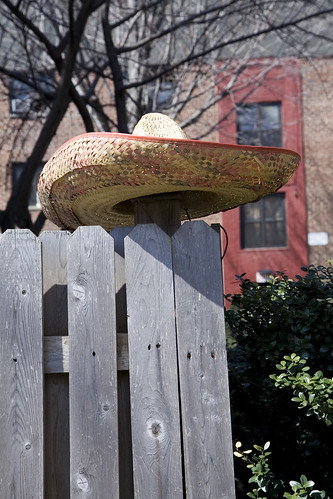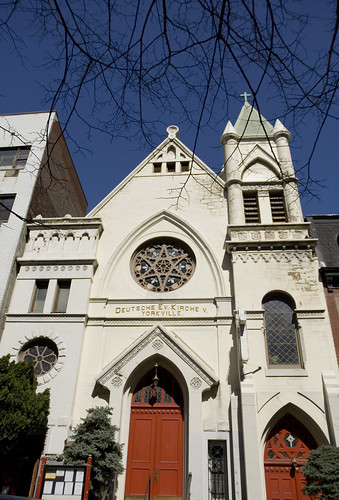
Author: MASadmin
365 #134: Chula is out of focus
When my perfect gown isn’t your perfect gown
Yes I am ripping off the title for a recent Manolo for the Brides post. Why? Because I agree with her.
It is ridiculously hard to dress another person in their style. Why? Because we all have our own preferences and we believe that another person would look awesome if they matched up with us. We like hoodies so they should wear hoodies. We like big puffy cupcake skirts so she should wear a big puffy cupcake skirt. I see this all the time on Say Yes to the Dress. Sisters, mothers, friends, look at the bride and start to dress themselves rather than let the bride dress herself. People mask their opinion under the gauze of “being honest” or “trying to help her look her best” but what they really should be saying is “I can only dress myself”. That’s the brutally honest answer to any subjective question about clothing and dress. When two bridesmaids come dress shopping, and one likes a mermaid while the other likes a ballgown, that is when the horns come out. And even if they were tactful and were kind, it doesn’t excuse that fact that they’re not being honest with themselves that their opinion, why valid, is only in relation to how they dress and what they wear. This is why Rachel Zoe is paid big money to dress celebrities to look like Rachel Zoe. If dressing others in their own style was easy, a lot of fun life drama would be done away with.
But I do think people should also be aware of this fact and paint other people’s opinions with a fine brush of a reality check. There’s no need to get defensive, to feel like you’re being attacked (even if you are), or to totally ignore another person’s opinion because “she/he can only dress themselves”. Rather, approach clothing and style with an open mind but realize that the final decision is yours. And, since it is your day, if haters don’t like it, let them hate. They’re still going to come to your wedding, eat your food, drink your booze, and embarrass themselves by falling into the cake. Let them do it.
My brother, after reading my last blog post, saw my mention of “wing tip” and immediately send me an IM telling me to never wears those for the love of all that is Good and Holy in the world. He even used caps. Five years ago, I would have gotten defensive. I would have automatically assumed he didn’t have any taste or style, that his opinion was wrong, and that he merely wanted to make me into a puppet that looked like him. But I’ve grown up a bit and I realize that my brother is just giving his stylistic opinion about something that he wouldn’t wear. We had a nice chat about elf shoes. Am I wearing wing tip shoes to my wedding? Of course not (he actually failed to read the post to the end before sending me an IM) but I value his opinion no matter how different our two styles are. If I didn’t, I’d scrub him from my contact list (which would then open up another can of worms with my mom questioning my sanity, etc etc but this is what families are for, right?). But if my brother told me to wear New Balance sneakers with ill fitting white jeans, a wrinkled polo shirt that was two sizes too big, and a hat with a trout through it, I’d slap him. I’ve done that once. No more!
365 #133: Lent is hard watching people eat what you can’t
Whoopie!

So I guess Sex and the City made cupcakes trendy. The New York Times is trying to do the same with Whoopie pies. I’m not sure it’ll work (the gray lady ain’t that sexy) but it does make me want to include them at my wedding. Variety is the spice of life after all. The only problem is that the none of the bakeries I shop at do whoopie pies exist on the menu. In fact, I probably haven’t eaten one in years. But that doesn’t mean I wouldn’t include a dozen at my wedding. Have you seen how they look? How can anyone say no to them? They just scream PUT ME IN YOUR BELLY. Or maybe I have a weird obsession and believe desserts can speak to me. And that they demand to be eaten. And live in my belly.
mmmmm.
365 #132: Midnight Cowboy
Rented shoes? This ain’t no bowling alley.
I hate the shiny shoes that you end up getting when you rent a tux. They remind me of the sleek, shiny, expensive, wastes of space that were the shoes I wore when I was in high school marching band those many years ago. They’re usually uncomfortable, have no trend, and, when I wear them, they make me feel like I’m 6 years old and I’m not able to dress myself. I’m 26 now and there is still room in the debate on whether I’m able to dress myself properly but, dog gone it, I’m not wearing those silly shoes on my wedding day. Rented shoes are for bowling and ice skating. I’m a grown up; I can afford my own shoes.
Plus, why let the bride have all the fun in choosing her own shoes? How many blog entries or wedding stories do you read about women find the perfect pair of shoes? Wedding photographers are taught that they HAVE to take a picture of the shoes. They’re second only to the dress in terms of bridal obsessions (or so it seems). And if they’re going to take it seriously, I might as well take it seriously too. I’ve already written about how I think Chucks at a wedding are overdone and not as cool as people think they are. But I don’t necessary hate all trends. I think they’re useful. And one trend that I’m enjoying quite a bit right now is the resurgence in oxford/vintage style shoes.
When a guy opens up GQ or Details or Men’s Vogue, we are told that we need to own at least several classic Italian or British made wing tips or oxford shoes. We bust out the Benjamins, invest in these shoes in our early twenties, make sure our feet never get fat, and just repair them when they wear out. Investing in shoes that will last decades is what we’re suppose to do. But I was never the kind of guy who, in his early 20s, could afford to spend 500 dollars on some shoes. In fact, I can barely afford that now and with a wedding coming up, I can’t justify to myself that extra cost (even though I would look pretty fly). So what do I do? I either head over to zappos and look for a sale or I raid Urban Outfitters.

To the Point Wingtip in brown $68

Bed Stu Stentorian Oxford in charcoal $78

UO Tonal Oxford in gray $78
They aren’t super formal, with fake leather, thin wood soles, but they fit rather well on anyone with a wide foot (which is my problem). They’re supped up casual and would go great in any type of wedding that’s less than black-tie. Comfortable, stylish, and affordable, they’re also the type of shoe you can wear to work, with a suit, with jeans, or whatever. With a one button suit, it would be perfect. But if you have to go up in style, they’re classy enough to work with whatever you’re given. They won’t work with an ultra formal tux with tails but, yeah, I’m not going to do that type of wedding anyways. I’m not a penguin.
If I didn’t already have my shoes for the wedding, Urban Outfitters would probably be where I’d go. I ended up, in December, buying a pair of Ted Baker Thyme oxfords in black. They’re the first “designer” piece of clothing I’ve ever purchased and I’m quite happy with them though the bottoms are pretty slick. That means it is easy for me to slide on asphalt. It also means that it’ll be easy for me to slide down the aisle at my church like I’m a figure skater. And it’ll mean I’ll bust out a mean moon walk on the dance floor. Booyah.

Mine are in black but they seem to be discontinued $135 (retail $210).




